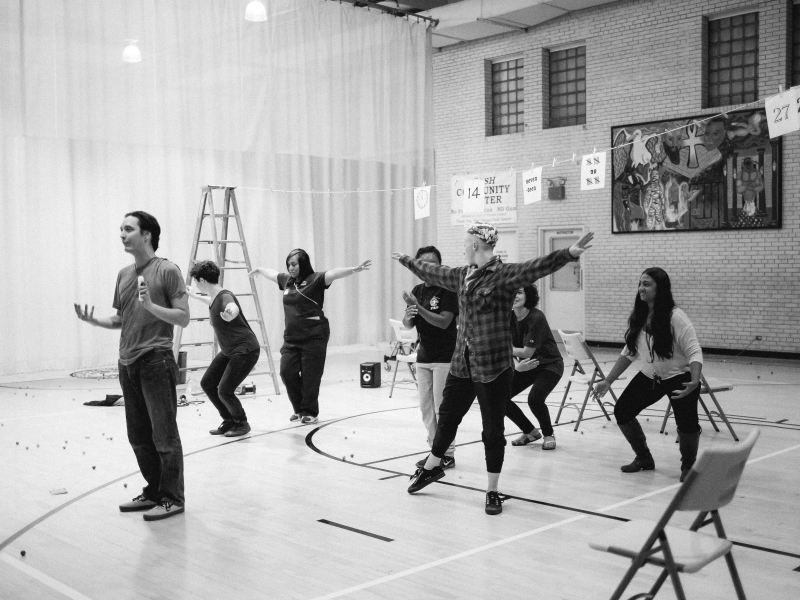Now that you’ve all had a couple of weeks to digest our amateur primer on micro-nations and their theatrical counterparts, it seemed important to dive in why show creator and Neo-Futurist Artistic Director Bilal Dardai felt compelled to create a show in which he and his cast set out to establish our recently-slightly-less-of-a-dump-formerly-above-a-funeral-home as its own micro-nation (it’s name will be determined on a nightly basis by the audience).
I thought about these burning questions for awhile and ultimately was like, “It’s okay, Megan. You don’t know everything, and you never will. Just go ask Bilal instead of trying to have all the answers. Bilal usually has more answers than you, and that’s okay. Especially when it pertains to a show that he wrote.” And then I stepped away from my research which had, at that point, really just devolved into watching the latest Elizabeth Smart interviews promoting her new book and then Googling random things about her personal life and religion.
MEGAN MERCIER: What were the main inspirations for you as the creator in pursuing the unique task of establishing your own micro-nation through the Neo aesthetic?
BILAL DARDAI: Nations are made of politics and politics are made of theater. The people who found micro-nations felt like kindred spirits to me, except instead of creating prose, play, or poetry, their form of artistic expression was to declare the world their block of marble and then chip a new shape out of it that they could call their own. I’d heard of people claiming their backyards an independent state before, but hadn’t really had an idea of how widespread and how long ago the practice began until I started looking into the phenomenon more closely. I also felt like the notion had become more virulent in American politics as of late, with thousands of people starting petitions to “liberate” Texas or another state from the tyranny of mumblemumble something mumblemumble Glenn Beck told me. The Neo aesthetic is all about honesty, openness, and the audience having a sense of agency and investment in the show they see…and I was intrigued by the idea that all of this might have to be twisted or subverted in some way in order to create a viable nation.
MM: The inspiration for micronations often seems derived from a positive socio-political mission rather than an egomaniacal need for power, which is how, historical, nations are annexed or seized during trying times that inevitably turn to bloodshed. Presuming there is no bloodshed in Sovereign Statement, and presuming that my comparative definition of micronations is accurate, what is your personal political mission through this process?
BD: Your presumption that there is no bloodshed is merely your presumption, and I will say no more than that. My personal political mission is in part to examine and reconcile my hope and my cynicism about the ability of a society to govern itself. You’re right that most micro-nations start off with a positive ideal in place, but the same could be said of many “recognized” nations. Nobody says that they will be leader of a new country with the intention to have it collapse into ruins around them. But they do, all the time, sometimes because the leaders are weaker than they realized or because they surrounded themselves with people who were opportunists and thugs. There is so much George Washington could have gotten wrong about the first years of American government but didn’t. On the other side of the spectrum, one wonders what would have become of the Soviet Union if Lenin hadn’t named Stalin his successor, if he’d instead chosen somebody less selfish and sociopathic.
MM: What personal experience of yours has been most responsible for driving this project for you?
BD: Although I don’t discuss it explicitly in this play, one of the consistently echoing questions of my life is whether or not the country in which I currently live is any place to be raising a child. Simultaneously, our theater is one of the places in my life where I’ve always felt the most at home, and theaters are places I most look forward to sharing with my son. It’s a logical, if ridiculous, leap to think that the solution is to build a better nation inside a theater.
MM: In an ideal scenario, who is a Neo-Futurists micro-nation for? Who are its most likely followers/citizens?
BD: Our best audience members are people who are engaged and thoughtful enough to participate, remember the experience afterwards, and let that memory shape their next attempt to participate. Our own internal ensemble governance is based on a consensus model. In the ideal, a Neo-Futurists micro-nation is filled with people eager to be part of the process in some way. But that’s not a bad ideal for most nations, I’d hazard.
—
Sovereign Statement
starts preview performances on Thursday, October 17th and runs through November 23rd.
Every Thursday, Friday, and Saturday at 7:30PM
Thursdays are Pay-What-You-Can
Tickets available online or by phone.
